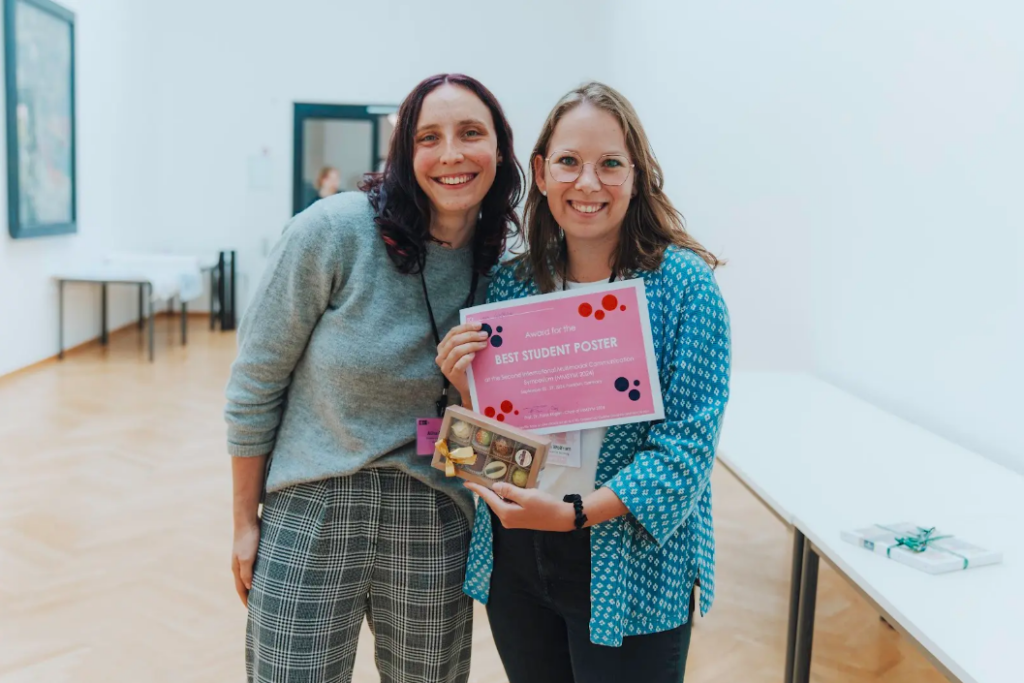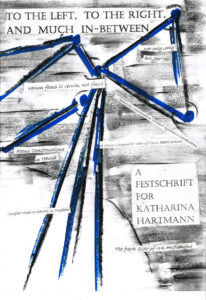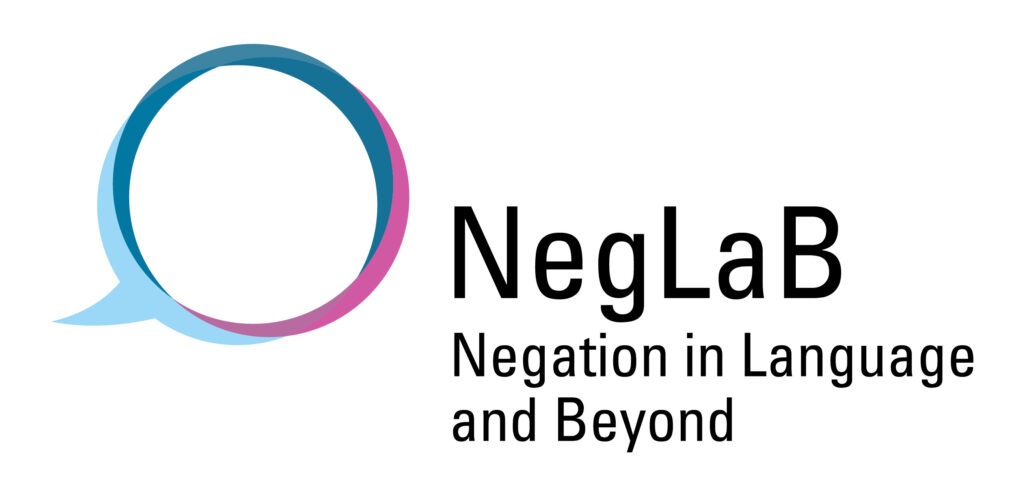Institut für Linguistik
Goethe-Universität Frankfurt
Willkommen
Willkommen am Institut für Linguistik! Auf dieser Seite finden Sie alle wichtigen Informationen, die das Institut betreffen.
Das Potenzialfeld Multimodal Communication
Im Januar 2026 ist das Potenzialfeld Multimodal Communication (Leitung: Cornelia Ebert, Frank Kügler) an der Goethe-Universität Frankfurt gestartet. Der Forschungsschwerpunkt zielt darauf ab, Wissenschaftler*innen aus der Linguistik, der Literatur- und Kulturwissenschaft, der Theater- und Performancestudien, der Film- und Medienwissenschaft, der Psychologie, der Neurokognition, der Musikwissenschaft sowie der Informatik zusammenzubringen.
Neuer DFG-Sonderforschungsbereich
Im Oktober 2025 startet an der Universität Tübingen der neue DFG-Sonderforschungsbereich Common Ground (SFB 1718). Wir freuen uns, dass das Institut für Linguistik mit dem Projekt Multimodalität, Ikonizität und der Common Ground: Zum Status von Lautsprache und Geste (PIs: Kathryn Barnes, Cornelia Ebert & Britta Stolterfoht) mit dabei ist.

Sinn und Bedeutung 30 (SuB30) 2025 in Frankfurt
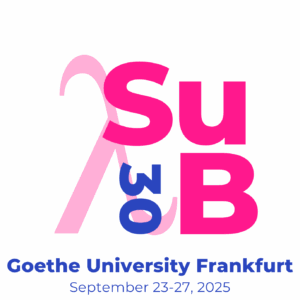
Die 30. Ausgabe der Konferenz Sinn und Bedeutung (SuB30) findet vom 23. bis 27. September 2025 an der Goethe-Universität Frankfurt statt und wird von der Professur für Semantik organisiert.
Die Konferenz umfasst:
-
eine dreitägige Main Session (24.–26. September)
-
zwei eintägige Special Sessions:
Weitere Informationen unter: https://vicom.info/sub30/
Beste studentische Präsentation der MMSYM 2024 aus Frankfurt
Die Mitarbeiterin und Doktorandin Alina Gregori, sowie Vera Wolfrum (Uni Würzburg) gewinnen beide auf der diesjährigen MMSYM den Preis für die beste studentische Präsentation.
Beste studentische Präsentation der Speech-Prosody 2024 aus Frankfurt
Die Mitarbeiterin und Doktorandin Anna Preßler gewinnt auf der diesjährigen Speech-Prosody-Konferenz den Preis für die beste studentische Präsentation.
Jacob- und Wilhelm-Grimm-Preise für internationale Germanistik an Ermenegildo Bidese
Ermenegildo Bidese (Universität Trento) hat 2021 im Fachbereich Neuere Philologien in Frankfurt habilitiert. 2024 erhält er den Jacob- und Wilhelm-Grimm-Preise für die internationale Germanistik des DAAD.
Ende der Seminare = Beginn der Hausarbeiten
Mit dem Ende der Vorlesungszeit beginnt die Arbeit an den Hausarbeiten. Wir bitten alle Studierende, die Hausarbeiten oder Abschlussarbeiten in der Linguistik schreiben, sich an unserem Leitfaden zu orientieren.
Wir feiern Katharina Hartmanns 60. Geburtstag
Während des Geburtstagsworkshops „Syntax in Focus – A workshop in honour of Katharina Hartmann’s 60th birthday“ überreichten wir am 12.01.2024 die Festschrift zu Ehren von Katharina: „To the left, to the right, and much in between“. Sie kann hier kostenlos als Ebook (PDF) heruntergeladen werden.
Wir beglückwünschen das Institut für Linguistik zum neu bewilligten Sonderforschungsbereich NegLaB
Ab April 2024 startet an der Goethe Uni der neue Sonderforschungsbereich der DFG „Negation in Language and Beyond“ (SFB 1629 NegLaB). Das Institut für Linguistik ist mit zahlreichen Projekten am SFB maßgeblich beteiligt.
MA-Student Farbod Eslami Khouzani erhält den diesjährigen DAAD-Preis
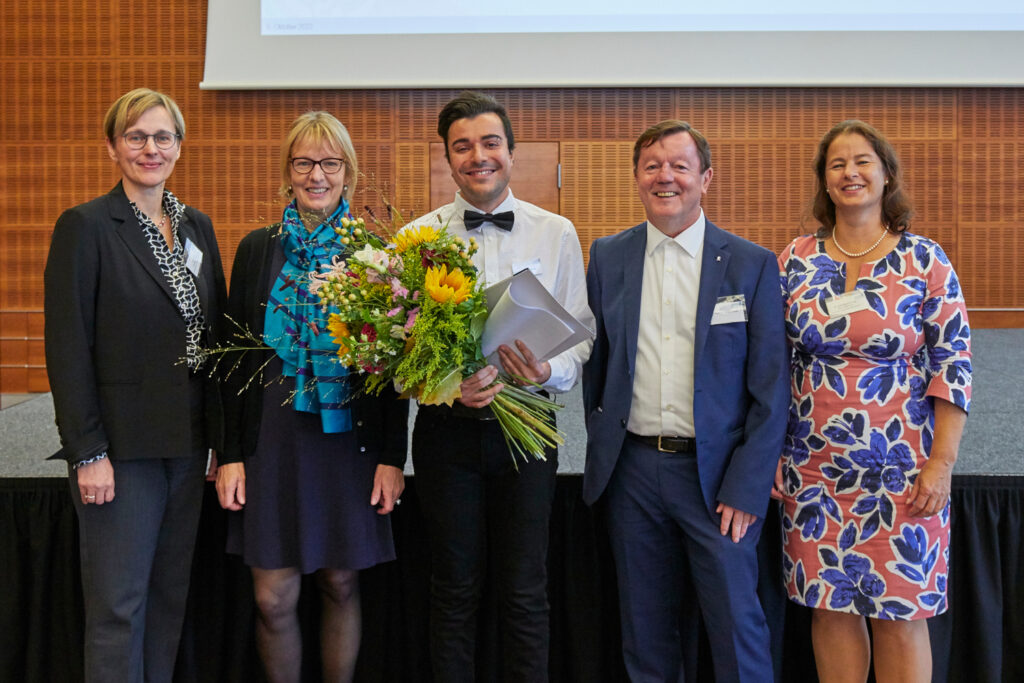
Der MA-Linguistik-Student Farbod Eslami Khouzani (Bild, Mitte) erhielt am 05.10.2023 den diesjährigen DAAD-Preis für internationale Studierende. Gewürdigt wurden seine hervorragenden Studienleistungen wie auch sein gesellschaftliches Engagement. Wir gratulieren herzlich! Mehr Informationen
Prof. Katharina Hartmann und Prof. Frank Kügler nominiert für die beste Promotionsbetreuung
Das Goethe Research Academy for Early Career Researchers (GRADE) verleiht jedes Jahr einen Preis für die beste Promotionsbetreuung. Dieses Jahr sind gleich zwei der Professor*innen aus der Linguistik nominiert: Prof. Frank Kügler und Prof. Katharina Hartmann. Mehr Informationen
Informationen für Studienanfänger*innen
- Dokumente, die nicht per E-Mail verschickt werden können, können in unserem “Hauspostfach 2” in der zentralen Poststelle (IG 257) hinterlegt werden.
- Wichtige Seiten mit aktuellen Informationen:
- Informationen zu Prüfungen (keine „Staatsexamen“):
https://www.pgks.de/
https://www.uni-frankfurt.de/73862497/ZPL___Aktuelles - Informationen fürs Lehramt (ABL):
https://lehrkraefteakademie.hessen.de/lehrerausbildung/pruefungsstellen/frankfurt-am-main/aktuelle-infos
- Informationen zu Prüfungen (keine „Staatsexamen“):
Studium
Das Institut für Linguistik der Goethe-Universität bietet in Zusammenarbeit mit dem Institut für England- und Amerikastudien, dem Institut für Psycholinguistik und Didaktik der deutschen Sprache und dem Institut für Romanische Sprachen und Literaturen zwei sprachwissenschaftliche Studiengänge an, den deutschsprachigen BA Linguistik sowie den englischsprachigen MA Linguistics, die beide ohne Nebenfach studiert werden. Außerdem bietet das Institut Veranstaltungen im Rahmen der Germanistik– und Lehramtsstudiengänge an.
Weiter Informationen:
- Ansprechpartner*innen
- Studienanfänger*innen
- Stundenpläne
- BA Linguistik
- MA Linguistics
- BA Germanistik
- Lehramtsstudium
- Erasmus-Programm (Studium im Ausland)
- Hinweise zu wissenschaftlichen Hausarbeiten
Forschung
Überblick zur Forschung am Institut
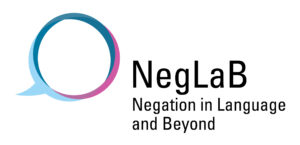 |
|
 |
Das in Frankfurt am Fachbereich 10 (Neuere Philologien) angesiedelte Institut für Linguistik kann besondere Expertise in den Bereichen Sprachstruktur (Syntax und Phonologie), Bedeutung (Semantik und Pragmatik), Psycholinguistik (Spracherwerb, Sprachverarbeitung) und historische Linguistik vorweisen – diese Bereiche werden von international bekannten Forscherpersönlichkeiten vertreten. Darüber hinaus bestehen enge Kontakte und über einzelne Projekte hinausgehende Kooperationen mit den Sprachwissenschaftlern in den Einzelphilologien am Fachbereich (Anglistik und Romanistik), mit der Philosophie (Fachbereich 8), und dem Institut für empirische Sprachwissenschaft am Fachbereich 9 (Sprach- und Kulturwissenschaften).
Neben dem Institut für Linguistik wird Linguistik in Forschung und Lehre auch in anderen Instituten betrieben. Details dazu finden Sie hier:
- Institut für England- und Amerikastudien,
- Institut für Psycholinguistik und Didaktik der deutschen Sprache
- Institut für Romanische Sprachen und Literaturen
- Institut für Empirische Sprachwissenschaften
Das Potenzial der Frankfurter Linguistik liegt vor allem im Bereich der linguistischen Grundlagenforschung. Die rege Forschungstätigkeit wird in diversen Projekten gebündelt.
Institut
Am Institut für Linguistik finden sich die folgenden Professuren:
- Professur Historische Linguistik (Weiß)
- Professur Phonologie (Kügler)
- Professur Psycholinguistik (Bader)
- Professur Semantik (Ebert)
- Professur Syntax (Hartmann)
In der Lehre sind dem Institut für Linguistik die folgenden Professuren angeschlossen:
- Professur für die Didaktik der deutschen Sprache (Grimm, kooptiert)
- Professur für Philosophie (Fuhrmann, kooptiert)
- Professur für Spracherwerb (Schulz, kooptiert)
Hier kommen Sie zur Seite der Geschäftsführung.
Das in Frankfurt am Fachbereich 10 (Neuere Philologien) angesiedelte Institut für Linguistik kann besondere Expertise in den Bereichen Sprachstruktur (Syntax und Phonologie), Bedeutung (Semantik und Pragmatik), Psycholinguistik (Spracherwerb, Sprachverarbeitung) und historische Linguistik vorweisen – diese Bereiche werden von international bekannten Forscherpersönlichkeiten vertreten.
Darüber hinaus bestehen enge Kontakte und über einzelne Projekte hinausgehende Kooperationen mit den Sprachwissenschaftlern in den Einzelphilologien am Fachbereich (Anglistik und Romanistik), mit der Philosophie (Fachbereich 8), und dem Institut für empirische Sprachwissenschaft am Fachbereich 9 (Sprach- und Kulturwissenschaften).
Das Potenzial der Frankfurter Linguistik liegt vor allem im Bereich der linguistischen Grundlagenforschung. Die rege Forschungstätigkeit wird unter anderem in der DFG-Forschergruppe Relativsätze gebündelt.
Das Institut für Linguistik betreut die Studiengänge BA- und MA-Linguistik, und ist für die linguistische Ausbildung im BA-Germanistik und in den Lehramtsstudiengängen (Fach Deutsch) zuständig.
FLAMM 2027: Second Workshop on Formal Linguistic Approaches to Multimodality
FLAMM 2027: Second Workshop on Formal Linguistic Approaches to Multimodality
We are happy to announce that the Semantics Department will organize the second Formal Linguistic Approaches to MultiModality (FLAMM) workshop on August 27–28, 2027, in collaboration with the Priority Program Visual Communication (ViCom).
The workshop aims to promote and advance the study of multimodality from a formal linguistic perspective by bringing together scholars interested in the formal analysis of visual and multimodal communication. With this event, we follow up on the first successful edition of the conference, which took place at Trinity College in Dublin.
Further details will be announced in due course.
Kick-off Workshop – Potential Field “Multimodal Communication” (MultiCom)
Kick-off Workshop – Potential Field Multimodal Communication (MultiCom)
May 18, 2026 | 11:00–18:30 | Forschungskolleg Humanwissenschaften, Bad Homburg
Since January 2026, the Potential Field Multimodal Communication (MultiCom) (speakers: Cornelia Ebert and Frank Kügler) has been established within Goethe University’s Profile Area Universality & Diversity. The initiative aims to develop a cross-disciplinary research focus on multimodal communication at Goethe University and within the Rhine–Main Universities (RMU).
MultiCom brings together scholars from linguistics and philology, literary and cultural studies, theatre, film and media studies, art history and visual culture, fine arts, history, psychology and cognitive neuroscience, musicology and ethnomusicology, as well as computational and digital humanities research.

To launch the initiative, we invite colleagues to a kick-off workshop that will introduce its scope and aims and connect perspectives from the participating disciplines. The workshop will be structured around short impulses and open contributions, providing space to share current projects, research questions, and ideas for collaboration across disciplinary boundaries. A central aim of the day is to discuss the future directions of the initiative.
If you would like to participate, please contact MultiCom’s project manager, Lennart Fritzsche, at fritzsche@em.uni-frankfurt.de by March 6, 2026. Further details regarding the program and possible contributions will follow once we have an overview of interested participants.
The workshop will take place in person.
Talk by Maria Aloni (Amsterdam) in the Semantics Colloquium
We are happy to announce a talk by Maria Aloni (Amsterdam) in the Semantics Colloquium.
The talk will take place on campus in IG 4.301.
If you wish to participate virtually via Zoom, please contact Lennart Fritzsche for the link.
Date: February 12, 2026
Time: 4 pm – 6 pm c.t.
Title: Nothing is Logical
Abstract:
People often reason in ways that deviate from classical logic. An influential idea introduced by Grice is that these deviations are not logical mistakes but rather consequences of pragmatic enrichments derived as the product of rational interactions between cooperative language users. Challenging the Gricean tradition, the core hypothesis behind this research is that many of the enriched interpretations we observe in everyday conversation are not derived by Gricean reasoning, but rather result from biases due to our [human] preference to minimise cognitive effort. I will present two such biases that on our hypothesis affect both reasoning and interpretation: (i) a tendency to avoid emptiness (neglect-zero); and (ii) a negative bias towards the parallel processing of multiple alternatives (no-split). In the lecture after introducing the two biases I will discuss some consequences of the core hypothesis and present experimental results that support the main claims.
A talk by Philipp Rauth (Saarland)
We are happy to announce a talk by Philipp Rauth (Saarland) in the Historical Linguistics Colloquium. The talk will take place in person.
Date: 12.02.2026
Time: 2pm – 4pm c.t.
Place: IG 2.201
Title: „Restitutive Adverbien im Deutschen“
Abstract:
Die Ambiguität des Adverbs wieder (und vergleichbaren Adverbien in anderen Sprachen) zwischen der restitutiven (1a) und repetitiven Lesart (1b) wurde in den letzten Jahrzehnten intensiv
erforscht (z.B. von Stechow 1996, Fabricius-Hansen 2001).
(1) a. Hannah schließt das FENSter wieder.
b. Hannah schließt das Fenster WIEder.
Die historische Entwicklung und die dialektale Variation stellen jedoch bisher noch ein Desiderat dar. In meinem Vortrag stelle ich eine historisch-dialektale Korpusstudie vor, die (i) zeigt,
dass die erstmals im Althochdeutschen belegte restitutive Lesart von wieder nicht zwingend eine Lehnübersetzung aus dem Lateinischen ist (vgl. Dückert 1957: 6–8), (ii) dass der Pfad des
semantischen Wandels bei solchen Adverbien nicht universell von restitutiv zu repetitiv verläuft (vgl. Zwarts 2019), (iii) dass wieder insbesondere an der westlichen und südlichen Peripherie des deutschen Sprachraums durch eine Vielzahl anderer Lexeme (nochmal, nocheins, herum, umhin, mehr, aber) ersetzt wurde, und dass (iv) schon immer bestimmte syntaktische und se mantische Eigenschaften (Mittelfeldposition, Aktionsart) jeweils eine der beiden Lesarten bevorzugen.
Dückert, Joachim. 1957. ‚Wider‘ und ‚wieder‘ im Neuhochdeutschen. Berlin: Humboldt-Universität, Dissertation.
Fabricius-Hansen, Cathrine. 2001. „Wi(e)der“ and „Again(st)“. In: Caroline Féry & Wolfgang Sternefeld (Hgg.), Audiatur Vox Sapientiae: A Festschrift for Arnim von Stechow, 101–130. Berlin: Akademie.
von Stechow, Arnim. 1996. The different readings of wieder ‘again’: A structural account. Journal of Semantics 13. 87–138.
Zwarts, Joost. 2019. From ‘back’ to ‘again’ in Dutch: The structure of the ‘re’ domain. Journal of Semantics 36. 211–240.
Talk by Christopher Saure (Wuppertal) in the Semantics Colloquium
We are happy to announce a talk by Christopher Saure (Wuppertal) in the Semantics Colloquium.
The talk will take place on campus in IG 4.301.
If you wish to participate virtually via Zoom, please contact Lennart Fritzsche for the link.
Date: February 5, 2026
Time: 4 pm – 6 pm c.t.
Title: The multiperspectival potential of indirect discourse
Abstract:
There is an overall consensus in the literature on perspectivization in language that indirect discourse (ID) does fundamentally not allow perspective shift of deictic expressions in its scope, which are thus obligatorily interpreted from the speaker’s context (e.g., Schlenker 2004). Consequently, research on perspective shift has been primarily focused on free indirect discourse (FID) for its seemingly unique display of multiperspectivity.
In this talk, I provide theoretical and empirical evidence that this prevalent view of ID does not accurately capture its true perspectival potential. Specifically, I argue that ID allows for the same indexicals to shift to the perspective of the reported utterance’s or thought’s original author as FID, namely spatio-temporal adverbs. Crucially, my proposal entails that perspective shift in ID is only unlocked if certain conditions are fulfilled and that the misconceptions about ID stem from a lack of recognition of these conditions in previous works. I discuss three conditions I deem to be significant for facilitating perspective shift in ID – narrative context, discourse prominence and type of propositional attitude verb – and highlight how these factors are relevant for the interpretation of FID as well. Moreover, I present the results of two experimental studies which show that, by taking into account the aforementioned factors, we can (a) increase the acceptability of shifted ID readings; and (b) significantly affect the interpretation of temporal indexicals in German ID.
Finally, I propose that these findings necessitate a uniform treatment of ID and FID. I briefly discuss which of the popular approaches to explain FID’s multiperspectivity – a double-context account (e.g., Schlenker 2004, Eckardt 2014) or a mixed quotation analysis (Maier 2015) – provides the ideal framework for this task.


